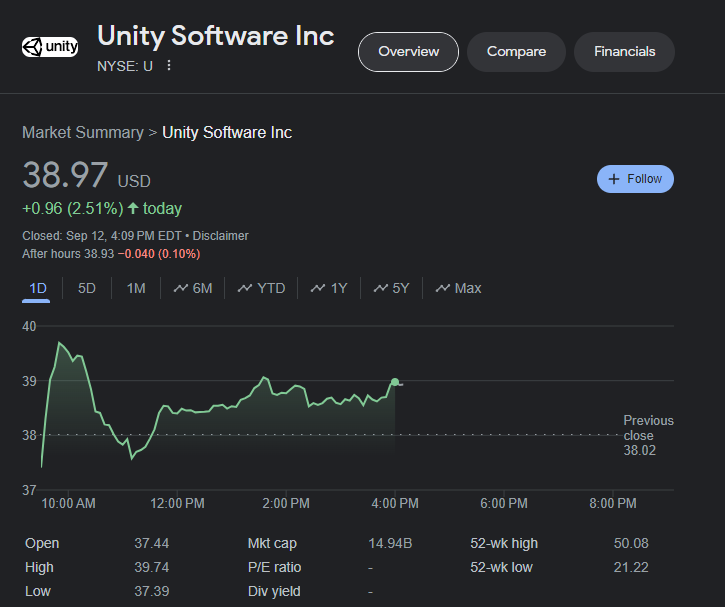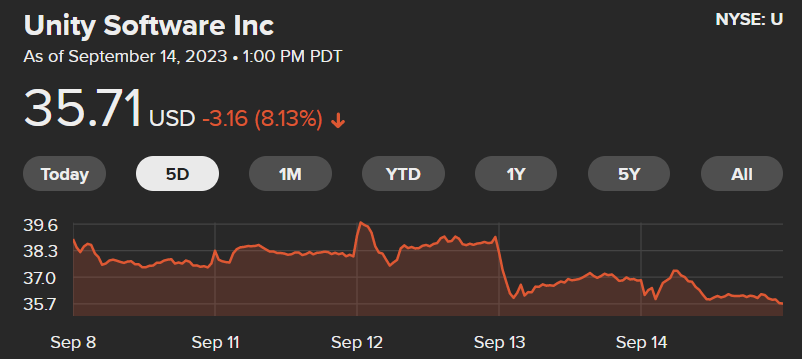Despite just announcing what I think of as terrible news, Unity stock is actually up today.

Resolves YES if Unity's stock is above 38.97 at market close in two years.
Otherwise this market will resolve NO at close.
- I will be factoring in stock splits, so the stock doing well and growing but splitting would still resolve a YES if appropriate.
- I will be using the NOMINAL value not inflation adjusted for simplicity.
People are also trading
@SneakySly The stock value is down (from 38.97 to 38..16) but the market cap is up (from 14.94B to 16.12B) because they've issued a lot of shares recently. I didn't know this was a thing. Will you consider this being up or being down?
@Lorenzo I think because of my initial wording I should count that as down? Up for arguments if this is misguided though.
Potentially relevant:
What happens if Unity is acquired by eg. Microsoft? https://manifold.markets/Bird/will-microsoft-announce-that-it-is-fde0f9651c2b
@Toby96 Unclear.
Two immediate options stand out to me:
- Resolve the market at the closing price of Unity when the acquisition goes through.
- N/A the market.
Feedback welcomed.
@jskf I don't think it is obvious what @SneakySly intends to do, but they liked your response without answering for themself. I won't be betting in this market until they answer.
@LukeHanks I was just on my phone at the time and wanted to double check my thoughts.
- I will be factoring in stock splits, so the stock doing well and growing but splitting would still resolve a YES if appropriate.
- I will be using the NOMINAL value not inflation adjusted for simplicity.
@Lorenzo
- I will be factoring in stock splits, so the stock doing well and growing but splitting would still resolve a YES if appropriate.
- I will be using the NOMINAL value not inflation adjusted for simplicity.
I'm on team "investors like new revenue streams and assume that companies won't commit seppuku in pursuit of short term stock gains, despite all evidence to the contrary."
That translates to expecting them to stick their guns on the runtime fees for longer than the month and also that, regardless of how that shakes out, developers making new projects will be avoiding unity in numbers significant enough to depress their stock price in two years.
@AndrewHartman I don't understand why this move of Unity's is so bad. Seems like it makes sense (other things being equal, which I'm sure they aren't) to have a revenue model that scales with the success of a game, that way the risk to developers is reduced? (Obviously it also reduces reward for the most successful games -- but in an industry as volatile as gaming that seems like a deal that many would take?)
Also, there are not THAT many game engines, and in-house engines are getting rarer and rarer for big games. Unity's price increase might look bad now, but what if Unreal bumps up prices next year and then the two big engines once again look roughly evenly matched?
Unrelated, but another justification for YES is just the fact that the general stock market, inflation, etc, is likely to drift upwards over the course of two years. Game engines as a category also seem like they are poised to do well (increasing use for VFX in hollywood, etc, plus their aforementioned increasing dominance within the games industry).
@JacksonWagner execution of the implementation of this plan has so far been poor, and can seemingly create scenarios where developers are in the red if they meet a certain level of success with certain developer business models.
@JacksonWagner People aren’t mad that Unity wants to get compensated. They’re mad because the new pricing model is a terrible idea (see below.) https://mastodon.gamedev.place/@runevision/111054492636125603
@JacksonWagner The catch is that installing a game is usually a free action on the part of a consumer. Either the game is paid upfront, and the consumer can install it as many times as they want on as many devices as they want, or the game is free, and can be installed and uninstalled freely. Charging a developer for something that’s free for the consumer and is expected to be done routinely is ridiculous.
A saner way to share in a game’s success would be to institute a revenue-sharing agreement, for example where Unity gets (say) 10% of a game’s revenue from both purchases of the game itself and any in-app purchases inside the game. That way developers would only have to pay for things that actually bring in money.
@Kronopath the problem is that unity users already pay for unity, and unreal takes a rev share cut. if unity adds rev share, devs will also move away because why do both?


